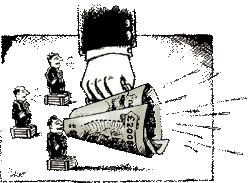 How could things have gone so bad so fast? It will be eight years next week that the country began its descent into hell. Nearly 9,000 Nepalis have died violent deaths, hundreds of thousands have been dispossessed, millions forced away from their homes and the country left in tatters. It is possible that if the Maoist insurgency had not been ignited in February 1996, we would still be mired in corrupt, go-nowhere parliamentary politics. And if our elite and politicians are unable to look beyond their narrow self-interests even when a rebellion is at the gates, maybe they never will.
How could things have gone so bad so fast? It will be eight years next week that the country began its descent into hell. Nearly 9,000 Nepalis have died violent deaths, hundreds of thousands have been dispossessed, millions forced away from their homes and the country left in tatters. It is possible that if the Maoist insurgency had not been ignited in February 1996, we would still be mired in corrupt, go-nowhere parliamentary politics. And if our elite and politicians are unable to look beyond their narrow self-interests even when a rebellion is at the gates, maybe they never will. But it is also quite possible that the distortions of a democratic polity would have worked themselves out and elected representatives at the grassroots (perhaps even some of those who bear arms today) would now be at the frontline of the war on want. If there had been a momentum for reform from below, it is quite likely that national politicians would have started to behave themselves.
Democracy has a built-in self-cleansing mechanism, a flexibility that brittle authoritarianism lacks. But we will never know. Instead, there is only the certainty that our country is polarised between a hard right and a ruthless left. It's not much of a choice. No one has asked the Nepali people what they want lately, but most today want
neither of the two. In the short-term, they just want an end to the unconscionable violence that has destroyed their lives, and in the longer-term they want a mechanism to ensure a just and lasting peace. If there hadn't been a war and if we still had a
parliament, we would still need to address the gross inequities in our society. Given a chance, it is possible that parliament would be debating political reforms through constitutional changes. Pushed from below, our law-makers may have been trying to tear down the exclusionist edifice built by successive Kathmandu elite that allowed only a privileged few to corner power, resources and opportunities. Unless that core crisis is addressed, we will have another violent revolt even if we somehow resolve this one. The political parties on the streets and the Maoists in the jungles are both struggling to attain this power transfer, but in different ways. Their common republican slogan has now become a code phrase for political devolution.
The writing on the wall is clear. The time has come for the entrenched power centres in Kathmandu to hand power back to the people. For the moment, it looks
like they don't want to give up without a fight. But in this war for power, there will be no real winners. The cost it will exact on the Maoists and the monarchy will bring both down and destroy the country in the process.


